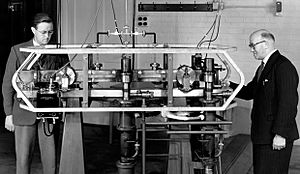Louis Essen facts for kids
Louis Essen (born September 6, 1908 – died August 24, 1997) was an English physicist. He is famous for making very exact measurements of time and for figuring out the speed of light with great accuracy. He also had some different ideas about Albert Einstein's theory of relativity, especially about how it related to time.
Quick facts for kids
Louis Essen
|
|
|---|---|
| Born | 6 September 1908 Nottingham, England, UK
|
| Died | 24 August 1997 (aged 88) Great Bookham, Surrey, England, UK
|
| Nationality | English |
| Known for | The atomic clock/speed of light |
| Awards | Fellow of the Royal Society (1960) A.S. Popov Gold Medal from the USSR Academy of Sciences (1959) Order of the British Empire (1959) Rabi Award of the IEEE UFFC (1987) |
| Scientific career | |
| Fields | physics |
| Doctoral advisor | D. W. Dye |
Contents
Early Discoveries
Louis Essen was born in Nottingham, England. He studied physics at the University of London and finished his degree in 1928. The next year, he started working at the National Physical Laboratory (NPL).
At NPL, he studied how tuning forks and quartz crystals could be used to measure time very precisely. In 1938, he created the quartz ring clock. This clock quickly became a worldwide standard for measuring time at places like observatories.
Measuring the Speed of Light
During World War II, Essen worked on radar technology. He invented several tools, including the cavity resonance wavemeter. This work gave him an idea: he thought he could measure the speed of light more accurately.
In 1946, with his colleague A.C. Gordon-Smith, he used a special microwave device. It had exact dimensions. By using his skills in time measurement, he found the frequency for different ways the waves could fit inside. Since the wavelength of these waves was known from the device's shape and electromagnetic theory, he could calculate the speed of light.
Their result was 299,792 kilometers per second. This was much faster than earlier measurements made with light. Many people were surprised and didn't believe him at first. Even his boss at NPL thought he would get the "correct result" once he improved his method. But Essen was determined. He believed in his own measurement skills. With some help from Alan Turing for calculations, he improved his equipment. In 1950, he repeated his measurement. This time, he found the speed of light to be 299,792.5 kilometers per second.
This value was accepted by scientists in 1957. Most measurements since then have agreed with his finding. In 1983, the official standard for the speed of light became 299,792.458 kilometers per second.
Creating Atomic Clocks
Louis Essen earned his advanced degrees from the University of London in 1941 and 1948. He then became interested in using the natural vibrations of atoms to measure time even better. Scientists in the US had already shown that caesium atoms could be used for this.
In 1955, Essen worked with Jack Parry. Together, they built the first practical atomic clock. They combined a caesium atomic standard with regular quartz clocks. This allowed existing timekeeping systems to be checked and made more accurate.
Setting Time Standards
Essen strongly believed that the caesium atom's vibrations should be the international standard for time. Other ideas for time standards had been suggested, but Essen was sure that caesium would be more stable.
In 1967, thanks to Essen's work, the "second" was officially redefined. It was no longer based on the Earth's movement around the sun. Instead, it was defined by the exact frequency of a specific vibration from a caesium atom. This was a huge step in making time measurement incredibly precise worldwide.
Later Years
Louis Essen spent his entire working life at the National Physical Laboratory. He retired in 1972.
In 1971, he wrote a book called The Special Theory of Relativity: A Critical Analysis. In this book, he questioned some parts of Special relativity. He said later that he was warned this might hurt his career.
Louis Essen passed away in Great Bookham, Surrey, in 1997.
Awards and Honours
- A.S. Popov Gold Medal from the USSR Academy of Sciences (1959)
- O.B.E. (1959)
- Fellow of the Royal Society (1960)
- Rabi Award of the IEEE Ultrasonics, Ferroelectrics, and Frequency Control Society (1987)


